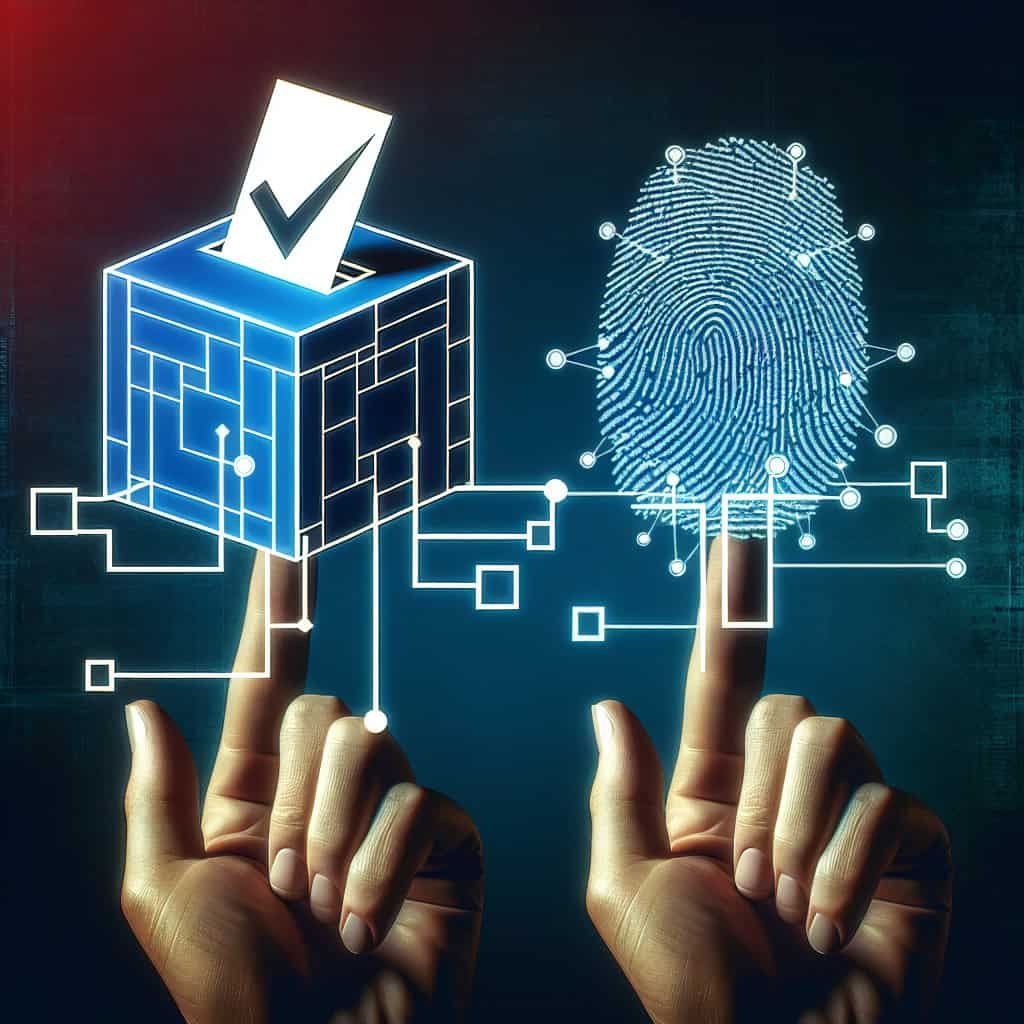Have you ever wondered how governments are embracing technology to enhance voting and identity systems? Blockchain technology, the highly secure and transparent digital ledger system, has caught the attention of governments worldwide. With its promise of increased security, efficiency, and trust, many countries are now exploring how blockchain can revolutionize their voting and identity systems. From digitizing voter registration to ensuring the integrity of election results, blockchain has the potential to reshape the way governments handle these crucial aspects. In this article, we will delve into the exciting developments and initiatives undertaken by governments in harnessing the power of blockchain for voting and identity systems.

Benefits of blockchain technology in voting systems
Blockchain technology offers several benefits when used in voting systems.
Enhanced security and transparency
One of the primary advantages of blockchain technology in voting systems is the enhanced security it provides. Traditional voting systems are often susceptible to various forms of fraud and tampering. However, blockchain technology offers a decentralized and transparent platform where every transaction or vote is recorded in a public ledger. This transparency ensures that all votes are accounted for and cannot be tampered with, thus increasing the security and integrity of the voting process.
Elimination of voter fraud
Blockchain technology has the potential to eliminate voter fraud, a significant concern in many voting systems. With the use of blockchain, every vote is recorded and linked to a unique identifier, ensuring that each vote is from a legitimate and eligible voter. This reduces the risk of duplicate votes, identity theft, and other forms of voter fraud. By preventing these fraudulent activities, the accuracy and fairness of the election process are greatly improved.
Immutable and tamper-proof records
In traditional voting systems, the integrity of election records can be compromised as they are susceptible to alteration or tampering. However, with blockchain technology, once a vote is recorded, it becomes an immutable and tamper-proof record. Each vote is encrypted and linked together in a chain of blocks, making it virtually impossible to alter or manipulate the data. This not only ensures the accuracy and integrity of the voting records but also increases public trust in the election results.
Challenges and concerns
While blockchain technology offers numerous benefits, there are also several challenges and concerns to consider when implementing it in voting systems.
Scalability issues
One of the major challenges with blockchain technology in voting systems is scalability. As the number of voters and transactions increases, the blockchain network may face issues in handling the load efficiently. Currently, many blockchain platforms struggle with scalability, which could result in delays or inefficiencies during the voting process. Governments and organizations must address these scalability concerns to ensure that blockchain-based voting systems can accommodate large-scale elections.
Potential for voter coercion
Another concern with blockchain-based voting systems is the potential for voter coercion. Since the transactions are recorded in a public ledger, it is possible for malicious actors to monitor and influence the voting decisions of individuals. For example, individuals may be coerced into voting a certain way under the threat of physical or financial harm. Governments must implement strict security measures to protect voters’ privacy and ensure that their voting decisions remain confidential.
Lack of technological literacy among voters
The successful implementation of blockchain-based voting systems relies on the technological literacy of voters. While blockchain technology offers enhanced security and transparency, it also requires users to have a certain level of understanding and proficiency in using digital systems. Not all voters may be comfortable or familiar with using technology, which could create barriers to participation. Governments should invest in voter education and accessibility initiatives to ensure that all eligible voters can fully participate in blockchain-based voting systems.

Case studies of governments implementing blockchain voting systems
Several governments have already begun exploring the use of blockchain technology for their voting systems. Let’s take a look at a few notable case studies:
Estonia’s e-Residency program
Estonia is often regarded as a pioneer in digital governance. Through its e-Residency program, Estonia has implemented blockchain technology in various sectors, including voting. The country conducted its first blockchain-based parliamentary election in 2018, allowing Estonian e-residents to vote from anywhere in the world. The use of blockchain ensured the security, transparency, and integrity of the voting process, providing a successful case study for other governments to assess.
West Virginia’s pilot project
In 2018, the state of West Virginia in the United States piloted a blockchain-based voting system for their primary elections. The pilot project aimed to improve the security and efficiency of the voting process, particularly for military personnel stationed overseas. Voters used a mobile application to cast their votes, which were encrypted and recorded on the blockchain. The project demonstrated the potential benefits of using blockchain in elections, but also highlighted the importance of addressing scalability issues and ensuring widespread adoption.
Brazil’s blockchain-based voting trial
In 2020, Brazil conducted a trial of blockchain-based voting in partnership with the Superior Electoral Court (TSE). The trial utilized blockchain technology to enhance the transparency and integrity of the voting process. The results showed that blockchain-based voting could significantly reduce the likelihood of fraud while providing a robust and auditable system for voter verification. The trial was considered successful and paved the way for further exploration of blockchain technology in Brazil’s electoral system.
Exploring blockchain for identity systems
Apart from its applications in voting systems, blockchain technology also holds potential for revolutionizing identity systems. Here are some key aspects to consider:
Verified and tamper-proof credentials
Blockchain technology can provide verified and tamper-proof credentials, eliminating the need for physical documents and reducing the risk of identity fraud. By storing identity information on a blockchain, individuals have more control over their personal data while maintaining a verified and immutable record of their identity.
Efficient and reliable authentication mechanisms
Traditional authentication methods often rely on complex and centralized systems that are vulnerable to hacking and data breaches. Blockchain-based identity systems can offer more efficient and reliable authentication mechanisms, allowing individuals to securely access various services without relying on a central authority. This can streamline processes and enhance the user experience.
Data privacy and ownership concerns
While blockchain technology offers increased security and transparency, it also raises concerns regarding data privacy and ownership. Storing personal information on a blockchain means that it is accessible to anyone with access to the network. Governments and organizations must address these concerns and implement stringent privacy measures to protect individuals’ data and ensure they have control over their personal information.

Government initiatives utilizing blockchain for identity management
Several governments have already taken steps to explore the use of blockchain technology in identity management. Let’s look at a few noteworthy initiatives:
India’s Aadhaar project
India’s Aadhaar project is one of the largest biometric identification systems in the world. By linking individuals’ Aadhaar numbers with their biometric data, the project aims to provide a unique and secure digital identity for every Indian citizen. While not specifically based on blockchain technology, the Aadhaar project demonstrates the government’s commitment to utilizing innovative solutions for identity management.
Canada’s self-sovereign identity initiative
Canada has been actively exploring the concept of self-sovereign identity (SSI) using blockchain technology. Through the Pan-Canadian Trust Framework, the Canadian government aims to empower individuals with control over their digital identities, allowing them to manage and share their personal information securely. This initiative focuses on decentralization and user-centricity, providing individuals with increased privacy and control over their personal data.
Switzerland’s blockchain-based digital identity scheme
Switzerland is known for its initiatives in innovative technologies, and its blockchain-based digital identity scheme is no exception. The Swiss government, in collaboration with various organizations, is developing a self-sovereign identity solution that leverages blockchain technology. This digital identity scheme aims to provide a secure and decentralized platform for individuals to manage and share their personal data while ensuring privacy and data protection.
Potential benefits and drawbacks of blockchain-based identity systems
Blockchain-based identity systems offer several potential benefits, but they also come with some drawbacks. Let’s explore both sides:
Streamlined access to public services
One of the significant benefits of blockchain-based identity systems is the potential for streamlined access to public services. By providing individuals with a secure and verified digital identity, they can quickly and securely access various government services, eliminating the need for repetitive paperwork and reducing administrative burden.
Reduced administrative costs
The implementation of blockchain-based identity systems can lead to reduced administrative costs for governments. By digitizing identity management processes, governments can automate tasks, reduce paperwork, and simplify verification processes, resulting in significant cost savings.
Risk of data breaches and identity theft
While blockchain technology offers enhanced security compared to traditional systems, there is still a risk of data breaches and identity theft. Since blockchain systems operate in a decentralized manner, a single vulnerability or malicious actor could potentially compromise the entire network. Governments must prioritize robust security measures and continuously monitor the technology to mitigate these risks effectively.

Technical considerations for implementing blockchain-based voting and identity systems
When implementing blockchain-based voting and identity systems, governments must consider several technical aspects:
Choosing the appropriate blockchain platform
Governments must carefully evaluate and choose the most suitable blockchain platform for their voting and identity systems. Factors such as scalability, security, and interoperability should be considered to ensure the chosen platform can handle the expected load and integrate seamlessly with existing systems.
Integration with existing systems
Blockchain-based voting and identity systems must integrate with existing government systems to ensure a smooth transition and interoperability. Governments need to evaluate how blockchain technology can be seamlessly integrated into their current infrastructure and processes, minimizing disruptions and maximizing efficiency.
Ensuring scalability and performance
To successfully implement blockchain-based voting and identity systems, scalability and performance must be addressed. Governments should work closely with blockchain developers and experts to ensure that the chosen platform can handle a large volume of transactions without compromising speed and efficiency.
Legal and regulatory implications of blockchain in voting and identity systems
The implementation of blockchain technology in voting and identity systems raises several legal and regulatory implications that governments must address:
Addressing privacy concerns
Blockchain technology offers transparency, but it also raises concerns about privacy. Governments must strike a balance between transparency and privacy, ensuring that personal data remains secure and that individuals’ privacy rights are protected. Clear guidelines and regulations must be established to address privacy concerns associated with blockchain-based systems.
Establishing legal frameworks for digital identities
Blockchain-based identity systems require the establishment of legal frameworks governing digital identities. Governments must draft legislation and regulations that outline the rights and responsibilities of individuals, organizations, and governments concerning digital identities. These legal frameworks should address issues such as identity theft, data ownership, and dispute resolution.
Ensuring compliance with data protection regulations
When implementing blockchain-based voting and identity systems, governments must ensure compliance with relevant data protection regulations. Blockchain systems involve the storage and processing of personal data, and governments must adhere to strict data protection laws to protect individuals’ rights and prevent unauthorized access or misuse of personal information.

Future prospects of blockchain technology in governance
Blockchain technology holds immense potential for transforming governance systems. Here are some future prospects to consider:
Potential for increased citizen engagement
Blockchain-based voting systems can potentially increase citizen engagement in the democratic process. By offering secure and accessible voting platforms, governments can encourage more individuals to participate in elections and express their opinions, leading to a more inclusive and representative democracy.
Reliability and trust in government processes
The use of blockchain technology in governance systems can increase trust and reliability in government processes. By providing transparent and immutable records, blockchain ensures the integrity of elections and identity management, reducing skepticism and enhancing public trust in government institutions.
Expanding applications beyond voting and identity systems
While voting and identity systems are the primary areas where blockchain is being explored, the technology has the potential to revolutionize various other areas of governance. Blockchain can be applied to areas such as supply chain management, land registry, healthcare, and more, offering increased efficiency, transparency, and security in these domains.
Conclusion
Blockchain technology has the potential to revolutionize voting and identity systems, offering enhanced security, transparency, and efficiency. While there are challenges and concerns to address, governments globally are actively exploring and implementing blockchain solutions in these areas. By striking a balance between innovation, security, and privacy considerations, governments can harness the transformative potential of blockchain and revolutionize governance processes for the better. Continued exploration and implementation by governments will shape the future of how we vote, prove our identity, and interact with government services.

